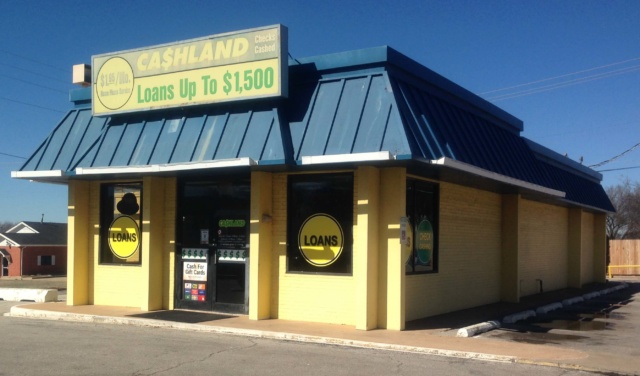

History: One either learns from it or finds oneself doomed to repeat it.
That’s a memo that may have missed the desk of Sen. Dan Newberry (R-Tulsa). In early January, the mortgage banker introduced SB 112, which, as stated on page 14 of the 32-page chunk of legislation, would increase the maximum payday loan amount from $500 to $1,500. A monthly interest rate of 17 percent could then be set on the new maximum.
The history Newberry appears to be missing occurred in 2016, when Sen. David Holt (R-OKC) authored a similar bill that would have allowed payday lenders to loan up to $3,000 at once and charge up to 20 percent interest per month. At the time, Oklahoma Watch published a story (written by a ghost, apparently) featuring tweets in which Holt publicly abandons his bill after outcry against it.
With Newberry’s SB 112, the outcry has begun anew: The Voices Organized In Civic Engagement (VOICE) group held a press conference last week in opposition to the bill. As Oklahoma Policy Institute’s David Blatt breathlessly pointed out in a press release regarding VOICE’s media event, “The interest due at the end of the first month would be $255!”
Bipartisan efforts seek to reduce loan risks
Luckily for VOICE and others who view payday lenders with a fair amount of side-eye, legislation to increase industry regulation has also appeared at 23rd and Lincoln.
First, HB 1404 by Rep. Mickey Dollens (D-OKC) would cap the annual percentage rate (APR) on payday loans at 60 percent. Current APRs (i.e. the cost of credit for a year) from Oklahoma’s payday lenders are between 391 percent to 521 percent.
Next, Rep. Kevin Calvey’s (R-OKC) HB 1596 would limit indebtedness to 90 days within a 365-day period. HB 1596 would also limit the number of loans a consumer could take out to one at a time. Further, this initiative would require 24 hours to elapse between the paying off of one payday loan and taking out of another.
Last, SB 108 by Sen. Kevin Matthews (D-Tulsa) and House author Rep. Regina Goodwin (D-Tulsa) is similar to Calvey’s bill in that it limits loans to one at a time, caps consumer indebtedness to 90 days with a 365-day period and prevents lenders from extending loans to people who have reached that 90-day period in a preceding 365-day period.
Payday lending background
Payday lending is known technically as deferred deposit lending. On Sept. 1, 2003, the Deferred Deposit Lending Act became law in Oklahoma. As of 2012, the Pew Charitable Trusts classified Oklahoma’s payday lending landscape as one of 28 “permissive” states, citing fewer regulations compared to other states and “readily available” storefronts from which consumers may take out payday loans.
When Holt floated his bill in 2016 at the behest of lending groups who sought to influence state policy in light of pending regulations at the federal level, the senator defended his decision by citing the power of the free market to determine what makes good business sense and what does not.
Opposition to that argument, which has been repeated in VOICE’s recent activities, posits that payday lenders disproportionately target an already poor and struggling working class from a predatory standpoint. In a January post on Public Radio Tulsa, OPI’s Blatt mentioned the following alternatives for consumers considering payday loans:
- ask employers for advances
- borrow from family or friends
- get a small loan from a bank or credit union
The article also states that Oklahoma’s more than 300 payday lenders doled out 945,000 loans to 162,000 customers for a total of $392 million in 2014.
Waiting game continues
As is the case with most legislation at this early point in the session, any potential changes to payday lending laws have a long way to go before being finalized.
SB 112 has yet to be heard in the Senate’s Business, Commerce and Tourism committee, of which author Newberry is the chairman. Meanwhile, HB 1404, HB 1596 and SB 108 have been referred to the House’s Banking, Financial Services and Pensions committee.




















